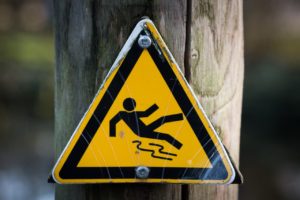How a Slip-and-Fall Can Lead to Paralysis

The slip-and-fall is often treated like a minor accident. After all, everyone has fallen at some point in their lives. The truth is, however, that slip-and-falls are far more dangerous than the typical trip-and-fall. These incidents can easily lead to brain injuries, fractured skulls, and, most debilitating of all, paralysis. But how can a slip lead to such a devastating injury? And how does paralysis impact a victim’s life?
The Different Types of Paralysis
The spinal cord is made up of millions of nerve cells or neurons. These nerves connect and pass signals from your brain to the rest of the body, such as your lungs, your legs, and your heart. When a spine injury leads to paralysis, it is because some of these nerves have been damaged or severed, leaving your brain unable to communicate with parts of your body. The kind of paralysis that you experience will depend on where in your spine is injured. The different types include:
Monoplegia: With this kind of paralysis, just one leg or one arm is paralyzed, leaving the other of the pair functional.
Hemiplegia: One arm as well as one leg on the same side of the body are paralyzed, whereas the other side of the body is functional as normal.
Paraplegia: The lower half of the body, normally from the waist down, is unable to move.
Quadriplegia: Both arms and both legs are paralyzed. This can often impact other parts of the body as well, such as the lungs and bowels.
That being said, paraplegia and quadriplegia are the two more common forms of paralysis. If an injury is done to the base of the spine, near the hips, then you will likely suffer paraplegia. On the other hand, if the injury is toward the top of the spine, around the neck area, then you will likely experience quadriplegia.
Either possibility is terrifying, but how exactly can a simple fall cause such a devastating injury?
How a Denver Fall Injury Can Cause Paralysis
When you slip, your legs are sent flying upward, which leaves you falling backward. Unlike when you trip forward, you cannot use your hands to catch you or slow your fall. Instead, you hit the ground full speed on your back. With a hard-enough floor, such as tile, linoleum, rock, or concrete, this impact can easily lead to fractures in your spine.
The spine itself is a relatively delicate bone. When it cracks, it damages the nerves that it surrounds. Whether the nerve is stretched, pinched, or torn, it can lead to extreme pain and partial or full paralysis. With more minor injuries, such as a stretched nerve, the damage can heal with time. But there are no cures for a torn or avulsed nerve.
Comedy uses pratfall to make us laugh, but the truth is that a slip-and-fall can quickly lead to a life-changing disability. In extreme circumstances, such as if the victim hit his head, falls can even be fatal. Sadly, because slip-and-falls are viewed as minor, the liable parties can be reluctant to pay proper compensation. They may even try to pin the blame on you, saying you should have been more careful, or should have seen the hazard and avoided it. Considering how life-altering paralysis can be, this kind of attitude can severely hurt those who have developed paralysis due to a slip-and-fall.
The Impacts of Paralysis
There are few injuries as life-changing as paralysis. Most able-bodied people go through life assuming that they will remain able-bodied for their entire life. Few of us consider that we may lose a limb, suffer head trauma, or become paralyzed. So, when these things do happen, we are not prepared for the sudden shift on our lives. Suddenly, you go from playing your favorite sports, roughhousing with your kids, and taking long walks with your dog to being wheelchair-bound.
This sudden change can leave people unable to work, enjoy their favorite activities, or even live an independent life. On top of the emotional fallout of this traumatic experience, those suffering from paralysis will also have to contend with the high levels of debt they incur. Spinal cord injuries require surgeries, physical therapy sessions, and medications. All of that costs a pretty penny. But if you already can’t work due to your injury, where are you supposed to get the money to pay this debt?
Well, to recover financially after such an extreme injury, your best bet is to file a claim against the party that is responsible for your slip-and-fall. Filing a successful claim requires the help of a skilled Denver premises liability attorney, however. For compassionate legal assistance, call Leventhal Puga Braley P.C. at (303) 759-9945 or toll-free (877) 433-3906 today. We are waiting to help.